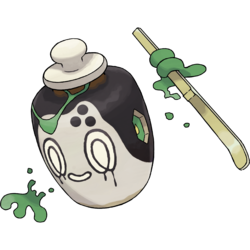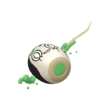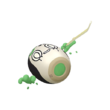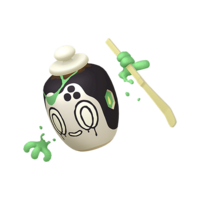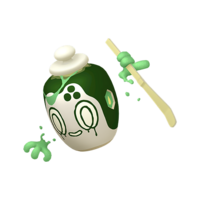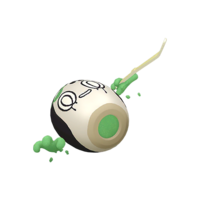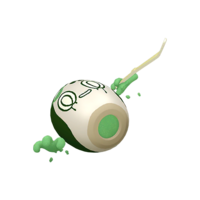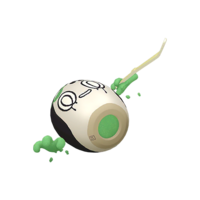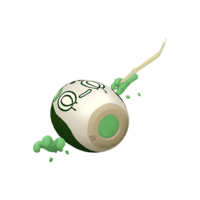|
|
| Line 392: |
Line 392: |
|
| |
|
| ==External links== | | ==External links== |
| | {{Template:Ecologically similar Pokémon}} |
| {{PokémonPrevNext/Head|type=Grass|type2=Ghost}} | | {{PokémonPrevNext/Head|type=Grass|type2=Ghost}} |
| {{PokémonPrevNext/Pokémon|type=Grass|type2=Ghost|prevnum=1011|prev=Dipplin|nextnum=1013|next=Sinistcha}} | | {{PokémonPrevNext/Pokémon|type=Grass|type2=Ghost|prevnum=1011|prev=Dipplin|nextnum=1013|next=Sinistcha}} |
Poltchageist (Japanese: チャデス Chadeath) is a dual-type Grass/Ghost Pokémon introduced during Generation IX, in The Teal Mask expansion.
It evolves into Sinistcha when exposed to an Unremarkable Teacup or a Masterpiece Teacup, depending on Poltchageist's form.
- Counterfeit Form (if it lacks a stamp of authenticity) requires an Unremarkable Teacup to evolve into Unremarkable Form Sinistcha.
- Artisan Form (if it has a stamp of authenticity) requires a Masterpiece Teacup to evolve into Masterpiece Form Sinistcha.
It is ecologically similar to Sinistea; however, the two are separate species.
Biology

The swirl pattern on Poltchageist's body.
Poltchageist is a Pokémon made of matcha tea powder that inhabits a tea caddy; specifically a 茶入 chaire, a kind used in the traditional Japanese tea ceremony. The tea caddy is primarily black and white, with a white lid, a sealed crack near the top, and a painted pattern resembling a face. Poltchageist is always seen carrying a 茶杓 chashaku, the tea scoop used to transfer tea powder into the tea bowl in the aforementioned tea ceremony.
Poltchageist heavily resembles Sinistea, although they are not biologically related. On top of its matcha body, just below its lid, is a yellow swirl pattern similar to the one found on Sinistea. On Sinistea, this swirl pattern serves as its weak spot and will cause it to become dizzy if stirred; however, this is not the case for Poltchageist.[1]
According to an old tale, Poltchageist was born from the regrets of an old tea master, who was so obsessed with perfecting the art of the tea ceremony that he drove away everyone around him.[2] Poltchageist is more active at night than during the day, prowling around towns and their outskirts. By day, Poltchageist dwells in cool, dark places — usually in old houses, which is its favorite.[1]
Poltchageist tends to scatter its matcha powder on people and food. If someone touches or ingests the powder, they will notice their skin apparently glowing for a brief moment, before they fall unconscious as their life force is sapped away by the powder for Poltchageist to use as energy.[1] It is capable of draining energy in this way from many people at once.[2] Another behavior exhibited by Poltchageist is its strong tendency to repair broken objects and seal cracks by filling them in with its matcha powder.[1][2]
Poltchageist and its evolved form, Sinistcha, are the only known Pokémon that can have Hospitality as an Ability.
Forms
Poltchageist has two separate forms: Counterfeit Form and Artisan Form. Telling either of these forms apart requires careful inspection; an Artisan Form Poltchageist bears a stamp of authenticity on the base of its caddy, while a Counterfeit Form Poltchageist lacks it.
| Counterfeit Form
|
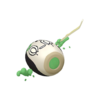
|
|
| Artisan Form
|
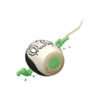
|
|
Evolution
Poltchageist evolves into Sinistcha.
Game data
Pokédex entries
| This Pokémon was unavailable prior to Generation IX.
|
| Generation IX
|
|
Paldea
#—
|
|
Kitakami
#76
|
|
Blueberry
#—
|
| Counterfeit Form
|
| Scarlet
|
Supposedly, the regrets of a tea ceremony master who died before perfecting his craft lingered in some matcha and became a Pokémon.
|
| Violet
|
Poltchageist looks like a regional form of Sinistea, but it was recently discovered that the two Pokémon are entirely unrelated.
|
| Artisan Form
|
| Scarlet
|
It sprinkles some of its powdery body onto food and drains the life-force from those who so much as lick it.
|
| Violet
|
It has taken up residence in a very expensive tea caddy. It takes an expert to distinguish the expensive tea caddies from the cheap ones.
|
|
|
Game locations
| This Pokémon was unavailable prior to Generation IX.
|
|
|
In side games
Held items
Stats
Base stats
| Stat
|
Range
|
| At Lv. 50
|
At Lv. 100
|
40
|
|
100 - 147
|
190 - 284
|
45
|
|
45 - 106
|
85 - 207
|
45
|
|
45 - 106
|
85 - 207
|
74
|
|
71 - 138
|
137 - 271
|
54
|
|
53 - 116
|
101 - 227
|
50
|
|
49 - 112
|
94 - 218
|
Total: 308
|
Other Pokémon with this total
|
- Minimum stats are calculated with 0 EVs, IVs of 0, and (if applicable) a hindering nature.
- Maximum stats are calculated with 252 EVs, IVs of 31, and (if applicable) a helpful nature.
|
Type effectiveness
| Under normal battle conditions in Generation IX, this Pokémon is:
|
|
|
|
|
|
|
|
|
|
|
|
|
Learnset
|
|
|
|
- Bold indicates a move that gets STAB when used by Poltchageist
- Italic indicates a move that gets STAB only when used by an Evolution of Poltchageist
|
|
|
|
|
- Bold indicates a move that gets STAB when used by Poltchageist
- Italic indicates a move that gets STAB only when used by an Evolution or an alternate form of Poltchageist
|
|
|
|
|
- Moves marked with an asterisk (*) must be chain bred onto Poltchageist
- Bold indicates a move that gets STAB when used by Poltchageist
- Italic indicates a move that gets STAB only when used by an Evolution of Poltchageist
|
Special moves
|
|
|
|
- A superscript level indicates that Poltchageist can learn this move normally in Generation IX
- Bold indicates a move that gets STAB when used by Poltchageist
- Italic indicates a move that gets STAB only when used by an Evolution of Poltchageist
|
Side game data
Form data
Poltchageist has two separate forms: Counterfeit Form and Artisan Form. Its form determines the form of Sinistcha it evolves into and cannot be changed.
The Artisan Form is rarer and has a stamp of authenticity hidden on the underside of its base. The only functional difference between the two forms is the Evolution item used by Poltchageist to evolve into Sinistcha: Counterfeit Form Poltchageist requires an Unremarkable Teacup to evolve into Unremarkable Form Sinistcha, while Artisan Form Poltchageist requires a Masterpiece Teacup to evolve into Masterpiece Form Sinistcha.
Artisan Form Poltchageist does not obey typical form inheritance rules when breeding, and therefore cannot produce Eggs that contain Artisan Form Poltchageist. All Poltchageist that hatch from Eggs will always be Counterfeit Form, regardless of the parent's form.
Evolution data
Counterfeit Form
Artisan Form
Sprites
| This Pokémon was unavailable prior to Generation IX.
|
|
|
In the TCG
- Main article: Poltchageist (TCG)
Trivia

The Haunting Tale of Poltchageist poster
- Poltchageist was first teased during the 2023 World Championships, where attendees were given a tea ceremony set with the date of the reveal trailer's release included. Additional teasers included the official Pokémon website featuring a background decorated with matcha powder, and a Kitakami poster advertising the in-universe theatrical performance shown in the trailer.
- Despite being a counterpart of Sinistea,[1] Poltchageist's name resembles that of Sinistea's evolution, Polteageist. The reverse is also true with Poltchageist's evolution, Sinistcha. They are the only ecologically similar Pokémon with this distinction.
- Poltchageist and Sinistea have similar evolution methods, as they both require being exposed to a specific item to evolve into a specific form of their evolved counterparts.
- The Poltchageist and Sinistea families are the only ecologically similar Pokémon that share a type and the only ones to share Egg Groups with each other.
- Additionally, Poltchageist and its evolution are the only ecologically similar Pokémon to have multiple forms.
- Poltchageist is tied with Basculegion and Slither Wing for the greatest number of unique characters in its English name, with 11 (including spaces).
- Poltchageist is the shortest Grass-type Pokémon, and is tied with Sinistea and Roaming Form Gimmighoul as the shortest Ghost-type Pokémon.
Origin
Poltchageist appears to be based on matcha, which is green tea that has been specially grown, processed, and finely ground into powder. It may also be based on a tsukumogami, being an inanimate household object come to life — in this case, equipment used in a Japanese tea ceremony. The three dots above Poltchageist's left eye resemble the Japanese map symbol for tea plantations.
Poltchageist's overall design resembles Sinistea, having similar eyes and spiral-like markings within its tea.[1] This may be a reference to convergent evolution or parallel evolution, which can lead to separate organisms independently developing similar or identical characteristics and body plans.
Additionally, due to the way it repairs broken objects, Poltchageist is also based on the process of 金継ぎ kintsugi,[3] in which cracked and broken pottery is mended using lacquer mixed with a metallic powder, usually gold.
Poltchageist's forms may be based on stoneware forgeries. One historical way to combat stoneware forgeries was to create a stamp of authenticity on products, hence the stamp under Artisan Form Poltchageist. It may also be a reference to the difference between unremarkable household objects and rare variants of them which are seen as antiques or masterpieces. Another origin for Poltchageist's forms may be the different grades of matcha, or matcha imitations.
Poltchageist may also be based on the Sandman, a mythical being which uses sand to make humans fall asleep, although in this case, it uses matcha powder instead.
Name origin
Poltchageist may be a combination of poltergeist and 抹茶 matcha, following the same naming pattern as Polteageist.
Chadeath may be a combination of 抹茶 matcha, death, and ポットデス Potdeath (Polteageist), as well as a pun on 茶です cha desu ("It's tea").
In other languages
| Language
|
Title
|
Meaning
|
 Japanese Japanese
|
チャデス Chadeath
|
From 抹茶 matcha, death, and 茶です cha desu
|
 French French
|
Poltchageist
|
Same as English name
|
 Spanish Spanish
|
Poltchageist
|
Same as English name
|
 German German
|
Mortcha
|
From mors or mort and 抹茶 matcha
|
 Italian Italian
|
Poltchageist
|
Same as English name
|
 Korean Korean
|
차데스 Chadeseu
|
Transcription of Japanese name
|
 Mandarin Chinese Mandarin Chinese
|
斯魔茶 Sīmóchá
|
From 斯 sī, 魔 mó, 茶 chá, and 是抹茶 shì mǒchá
|
 Cantonese Chinese Cantonese Chinese
|
斯魔茶 Sīmōchàh
|
From 斯 sī, 魔 mō, 茶 chàh, and 是抹茶 sih mutchàh
|
|
|
|
|
|
|
|
Related articles
References
External links

|
This Pokémon article is part of Project Pokédex, a Bulbapedia project that aims to write comprehensive articles on each Pokémon species, as well as Pokémon groups and forms.
|

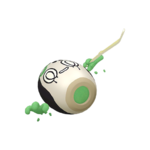
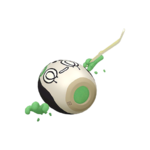
 For other sprites and images, please see Poltchageist images on the Bulbagarden Archives.
For other sprites and images, please see Poltchageist images on the Bulbagarden Archives.
